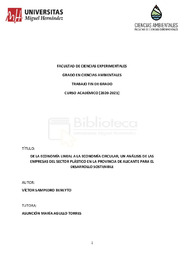Por favor, use este identificador para citar o enlazar este ítem:
https://hdl.handle.net/11000/8725Registro completo de metadatos
| Campo DC | Valor | Lengua/Idioma |
|---|---|---|
| dc.contributor.advisor | Agulló Torres, Asunción María | - |
| dc.contributor.author | Sampedro Beneyto, Víctor | - |
| dc.contributor.other | Departamentos de la UMH::Economía Agroambiental,Ing. Cartográfica y Expresión Gráfica en la Ingeniería | es |
| dc.date.accessioned | 2021-10-18T18:02:16Z | - |
| dc.date.available | 2021-10-18T18:02:16Z | - |
| dc.date.created | 2021-07-12 | - |
| dc.date.issued | 2021-10-18 | - |
| dc.identifier.uri | http://hdl.handle.net/11000/8725 | - |
| dc.description.abstract | Una mentalidad consumista y un modelo lineal han caracterizado el crecimiento económico mundial. Este modelo está basado en «comprar, usar y tirar», el cual ya no resulta válido en un medio-largo plazo. La necesidad de modernizar la economía, no perder competitividad y a la vez avanzar hacia un modelo sostenible, han sido los principales argumentos de la Unión Europea para dar un paso definitivo hacia la Economía Circular. En primer lugar, desde una perspectiva teórica, el trabajo que se va a presentar consiste en definir los conceptos tanto de Economía Circular como de Economía Lineal. Además, abordaremos las diferencias entre ambas, observando los beneficios económicos, sociales y ambientales de este nuevo método. En segundo lugar, se analizarán los modelos de algunas empresas y en qué grado van hacia una Economía Circular. Por último, se va a llevar a cabo una investigación social para ver si los ciudadanos suelen comprar más productos que puedan reutilizarse, de un solo uso o directamente les es indiferente. Con todo lo anterior, se diseñarán los escenarios de proyección futura de la Economía Lineal a la Economía Circular, observando los costes/beneficios tanto ambientales como económicos en la actualidad y de cara al futuro. | es |
| dc.description.abstract | A consumerist mentality and a linear model have characterised global economic growth. This model is based on "buy, use and throw away", which is no longer valid in the medium to long term. The need to modernise the economy, not to lose competitiveness and at the same time to move towards a sustainable model, have been the main arguments of the European Union to take a definitive step towards the Circular Economy. Firstly, from a theoretical perspective, the project to be presented consists in defining the concepts of both the Circular Economy and the Linear Economy. In addition, we are addressing the differences between the two of them, looking at the economic, social, and environmental benefits of this new method. Secondly, we are analysing the models of some companies and to what extent they are moving towards a circular economy. Finally, a social research is being carried out to see if citizens tend to buy more products that may be reused, single-use products or if they are indifferent to it. Considering all the above mentioned, future scenarios, from the Linear Economy to the Circular Economy, should be designed. These scenarios must pay attention not only to environmental and economic costs/benefits in the present, but also in the future. | es |
| dc.format | application/pdf | es |
| dc.format.extent | 49 | es |
| dc.language.iso | spa | es |
| dc.rights | info:eu-repo/semantics/openAccess | es |
| dc.subject | Economía Circular, Economía Lineal, sector del plástico, provincia de Alicante y ODS | es |
| dc.subject | Circular Economy, Linear Economy, plastic sector, Alicante province and SDGs | es |
| dc.subject.other | CDU::5 - Ciencias puras y naturales::50 - Generalidades sobre las ciencias puras::504 - Ciencias del medio ambiente | es |
| dc.title | De la economía lineal a la economía circular, un análisis de las empresas del sector plástico en la provincia de Alicante para el desarrollo sostenible | es |
| dc.type | info:eu-repo/semantics/bachelorThesis | es |
| dc.type | info:eu-repo/semantics/bachelorThesis | es |
| dc.type | info:eu-repo/semantics/bachelorThesis | es |

Ver/Abrir:
TFG-Sampedro Beneyto, Víctor.pdf
2,45 MB
Adobe PDF
Compartir:
 La licencia se describe como: Atribución-NonComercial-NoDerivada 4.0 Internacional.
La licencia se describe como: Atribución-NonComercial-NoDerivada 4.0 Internacional.
.png)